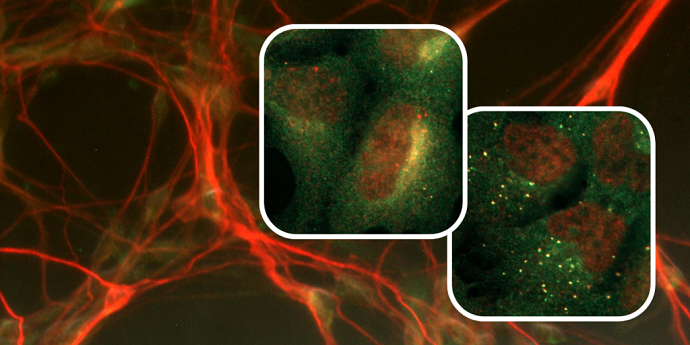- A Babraham Research Campus collaboration fund is supporting an exciting project that unites expertise in cellular reprogramming and the cellular process of autophagy to explore the role of this process in the development of Alzheimer's Disease.
- Researchers from Babraham Research Campus company Stemnovate will collaborate with senior group leader Dr Nick Ktistakis.
- The project aims to uncover a better understanding of the connection between autophagy and neurodegeneration, creating a cell-based model that can be used to identify new targets for drug development.
A pump-priming collaboration grant to the Babraham Research Campus-based company Stemnovate Ltd. and Dr Nick Ktistakis from the Babraham Institute will support a proof-of-principle project to understand how the cellular quality control process of autophagy targets protein aggregates in the brain. Using blood or skin samples from volunteer donors, the research project will look to provide an important piece in the puzzle to determine how autophagy is important for brain health.
Autophagy is a process of nutrient recycling and elimination of unnecessary or damaged cellular material in cells, leading to a periodic clean-up of the cell interior and recycling of nutrients during times of low resources.
The suppression of autophagy and the subsequent build-up of aggregated proteins may be one causative agent for neurodegenerative disorders such as Alzheimer's Disease and the project will explore the role of protein aggregation in Alzheimer's, known as a tauopathy.
Both located on the Babraham Research Campus, Stemnovate will use its expertise in controlling cell identity through cellular reprogramming and cellular differentiation, plus experience of working with donated patient samples, to produce neuronal cell lines for analysis by the Ktistakis lab. Dr Nick Ktistakis’s research focuses on understanding autophagy in healthy cells and in the context of diseases.
Dr Ruchi Sharma, CEO of Stemnovate, said, "The tau protein is a potential treatment target for Alzheimer’s and understanding its role may improve the age-related physiological decline. Moreover, the novel cellular modelling helps us understand the devastating condition that has already affected millions of people in our ageing population.”
Dr Nick Ktistakis, senior group leader at the Babraham Institute and an expert on the autophagy process, said, "We are very excited to take advantage of this opportunity to work in partnership with Stemnovate and to apply our autophagy assays and cutting-edge imaging analysis to better understand the connection between autophagy and neurodegeneration."
The risk of dementia increases with age, with an estimated frequency of one in 14 people over the age of 65 being affected, which increases to one in every six people over the age of 80 (source: NHS1). According to Alzheimer’s Research UK, approximately six out of every 10 cases of dementia is due to Alzheimer’s2. In addition to the personal toll dementia takes on lives, the economic cost of dementia in the UK in 2021 was estimated to be £25 billion, with these costs expected to rise to £47 billion in 2050 (source: Dementia Statistics Hub, Alzheimer’s Research UK3).
Dr Ktistakis outlined their hopes for the project’s outcomes: “If we can discover when and how autophagy acts to prevent protein aggregates forming then this will identify targets that can be assessed as therapeutic candidates to enhance good protein clearance. In itself, the model we will develop through this joint work can be used in the future to further understand neurodegeneration and identify potential treatments.”
The research collaboration will work with samples donated from people diagnosed with Alzheimer’s Disease. Dr Sharma explained: “We are asking members of the public to get involved with this research by donating a blood sample or a small skin sample from which we can obtain the cells needed for our research. We know the impact that this disease has on individuals and families and we hope that we can make an important contribution, alongside other research efforts, to improve our understanding of this disease.”
People interested in finding out more about donating samples to the study can contact Stemnovate on info@stemnovate.co.uk.
Dr Kathryn Chapman, Director of Science and Entrepreneurship at the Babraham Research Campus, who oversees the Babraham Research Campus funding programme that will support this project, said: “We’re passionate about making the Campus the best place to start and grow a life science venture. By supporting early stage discovery through connecting innovation across academic research and commercial research we are accelerating the delivery of knowledge and tools that will make a real-world difference. The collaboration between Stemnovate and the Institute is a perfect demonstration of this impact and I can’t wait to see where it will lead.”


